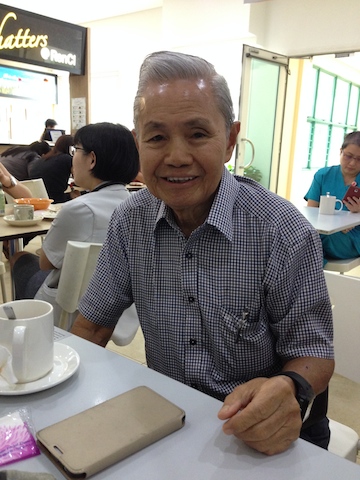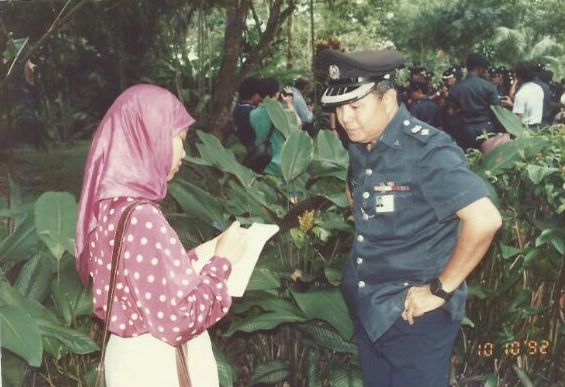Hooked on learning
There is no stopping Clement Tan as he really enjoys learning new things, with a Master’s degree possibly on the cards.
BY: Eleanor Yap
Clement Tan, 75, is a firm believer of lifelong learning at whatever age. The father of three and grandfather of one shared that this belief can be traced back to his past.
His father was a teacher and he told Clement that during the Japanese Occupation in Singapore, he had befriended a Japanese soldier, who was keen to learn English so he gave him tuition. All this bode well for the family as instead of getting threatened by the Japanese like most people, Clement’s family was given rations. “I was too young when this happened. I learned about this much later. Maybe this could be my birth of [my desire] to want to learn.”
His other desire
He also wanted to become a police inspector. As a teenager, he said he had many girlfriends. One time, one of his girlfriends criticised him and called him a goat “till he couldn’t take it anymore”. Furious, he dashed to her house to confront her but ended up getting whacked by her elder brother. After the incident, he went to the police station to make a police report and they brought him to be examined and treated by a doctor at SGH.
After which, he saw the police inspector who asked him to then go home. “I was not satisfied for being assaulted, so the inspector in his uniform went with me to the girl’s house. Her brother wanted to bash me up again but when he saw the inspector, he acted like a sheep and almost knelt down!”
The inspector warned the brother not to touch Clement again or else he would bring him to court. “[Seeing the brother’s reaction], I saw how powerful the position the inspector was in (in Hokkien, he is referred to as tua-kow for big dog) and so I made up my mind then that I wanted to become like him.” However, just because he wanted it, didn’t mean it was in his grasp.
The requirement to get into the Police Force as an inspector at the time was an ‘O’ Level, but sadly, he flunked his PSLE and had to stay back in Primary 6 for another year. He eventually got his ‘O’ Levels, but then the requirements again changed. This time, he had to have his ‘A’ Levels to get into the rank of inspector; so he had no option but to join the Force as a mata mata (policeman), but he would be allowed to study and take qualifying examinations to be become an inspector. Only then if he qualified, the Force might consider promoting him to inspector. Clement got into the Force in 1959 and was determined to climb up the ranks.
“I used to pound the beat, carrying my haversack of law books and studying them.” Clement shared that one time, he was working at the Tanjong Murai post (end of Lim Chu Kang) and his sergeant had promised to fetch him to take his law test. He couldn’t come so another friend brought him via Johor Bahru and he managed to take the test. “My desire to pass the exam was very big.”
He worked for four to five years as a mata mata before getting promoted. In his last year, he was a detective police constable in the travel control at Paya Lebar Airport. He was invited to join the Junior Police Officers’ Association as secretary. Through the Association, he shared he and the junior officers managed to deal with a number of issues. Instead of wearing a number whilst in uniform, they were allowed to wear their own names. And instead of staying back on Friday night shifts to clean up the station including the toilets, the junior officers could leave and cleaners were then engaged. Clement’s role as secretary of the Association ceased after he was promoted.
He was also the first batch to be sent to Malaya to the Police College as part of a three-month officers’ training. After one month there, he got promoted to cadet inspector. He was finally getting to where he wanted to be. “When I was in training there, we all were treated very well. We even had a waiter each at our side during dinner to tell us which utensils to use.” After the stint, he returned to the Republic to complete the last three months’ training in a more ‘Spartan’ environment, as he called it.

Clement (far right) with his family. He was so crazy about wearing a uniform that he borrowed his uncle's Scout belt!
Cases of unnatural deaths
Three months later, he got posted to the Beach Road police station. “That time, I was as real tua-kow. I was high and mighty, and we were wearing shorts. Foreigners called us Boy-Scouts!” He was a routine officer, handling gambling and brothel raids. He didn’t deal with crime; his cases involved mainly unnatural deaths like suicides and accidental deaths. Clement shared: “I had the most cases of unnatural deaths to a point that other inspectors didn’t want to use my table as it was sway (in Hokkien, means calamity).” He said that one time, there was a corpse lying on the beach. The rule was if it was lying in the water, the Marine Division would take it; so officers often look at the ‘Time and Tide’ section of the newspapers before proceeding to the scene!
Also, he shared that normally after a death case, he would have to collect the corpse and put it in the mortuary for families to identify. One time, he said that the brother of a victim came but didn’t want to see the corpse. He signed the papers and collected the corpse. However, a day or two later, an inspector called Clement and asked him to come down to the morgue as something happened. “He told me that his ‘corpse’ was missing, most probably collected and buried by the relative of a corpse of my case.” Clement found that the said relative had buried the corpse. He drove down to see him to try to remedy the situation and helped to get an undertaker to transfer the corpse. “If the case is not solved, the whole lot of officers would get into trouble!”
His road to become a full-fledged police inspector still had its obstacles. He had to pass a Standard 1 of Higher English, so again he had to attend classes in the 1960s. “It was very difficult to pass but I managed to and got confirmed as a police inspector.” He stayed in the Force till he retired in 1985. The last 10 years he was an instructor teaching law at the Old Police Academy (at Thomson Road). He was also a physical instructor at the Academy. “The trainees were afraid of me. Usually on the last day of their training, I would bring them on the longest run to the MacRitchie Reservoir and back to the Academy.”
Loving police work
After his retirement from the Force, Clement still continued to work there but this time in their Volunteer Special Constabulary (VSC) and stayed for 15 years. He worked twice a week at night and was paid S$2.60 an hour. His first posting was as a discipline officer where he took statements and did investigations with a team of special constabulary (SC) officers. Later, he became a training officer in the Senior Officer’s Course where he taught investigation work to SC inspectors. In the daytime, he was working at MINDEF till 1990 as head of DSO (now called DSO National Laboratories) for five years. In the meantime, he took over 10 extracurricular courses (non-examinations) at NUS over the weekends on problem-solving, leadership, human resources, speed-reading and supervisory management.
“I am curious so I wanted to learn.” He also took management courses at SIM and Beacon International College, and qualified with diplomas in management training. Clement said: “I wanted to join the commercial market as a HR manager and needed these certificates. I was preparing myself.” But he never did become a HR manager as he couldn’t get a job so he started looking for jobs as a security manager. After MINDEF, he worked nine and a half years as a regional security manager for Maxtor Peripherals, a producer of disk drives, before his full retirement in 2000.
Active & always learning
However, he still continued to stay active and learning. He recently attained competency certificate in ACTA (Advanced Certificate in Training & Assessment) and DACE (Diploma in Adult & Continuing Education) through the Institute of Adult Learning. Currently, he is contemplating either to go for a Specialist Diploma for facilitators or a Master’s degree in training and development. “If I take up a Specialist Diploma, I feel I won’t go far with my age, however if I take the Master’s (four years of part-time study), I might be able to get a trainer’s job.”
However, the bigger question still remains whether after his diploma or degree anyone would offer him a job at his age. “Lower-end jobs are easy to find however, higher-end ones are not so easy as they look at one’s age rather than experience.” For now, it is not a concern for him. “I can’t stop learning; I am hooked on it. Even now I am putting together my own training programme on how to focus and how to make decisions in hopes of conducting these courses, even for free.” He quoted Confucius, “If you live, trying living like it’s the last day of your life!” and added “And if you study, keep studying like you are going to live forever!”
1 Comment
Trackbacks/Pingbacks
- Police stories - [...] If you missed Clement’s detailed story about why he wanted to be a policeman, you can read it HERE.…



Achieving the life – & world – of a police officer through self advancement! … a difficult process of learning,
truly wonderful!